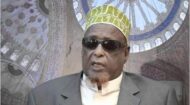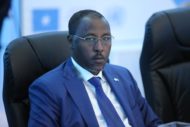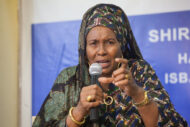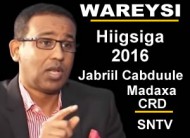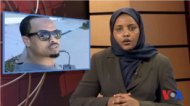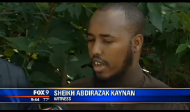

In a much-feted ceremony on January 24, the UN Political Office for Somalia (UNPOS), headed by the United Nations Special Representative of the Secretary General (SRSG) for Somalia, Dr. Augustine Mahiga, relocated permanently to Mogadishu.
While in Mogadishu earlier this month,
Somalia Report editors Jay Bahadur and Venetia Archer interviewed SRSG Mahiga about the peace process, al-Shabaab, and his personal interest in Somalia.
How have things been going since you arrived in Mogadishu to stay?
I seriously feel my deployment was long overdue, and I am already starting to feel the need for daily interaction with Somali interlocutors and partners. There are issues that make a whole world of difference to address on the ground rather than addressing them on the telephone and with the occasional visit.
Yesterday, I was with the PM (Prime Minister Abdiweli Mohamed) and we were going through the work program on what it’s going to take to complete the transition, including implementation of the Roadmap and Garowe principles, in that we have to work almost around the clock on a daily basis.
It’s not only the need for consultations, but meticulous planning and execution of the work program around the constitution, the drafting, the formation of the constituent assembly to adopt the constitution, and thereafter all the reforms related to parliament. We need to bring all these processes much closer to the people. So far, though we have the signatories of the major actors, the challenge we have is to bring the Roadmap and the Garowe principles to the grassroots, and this will be reflected in the formation of the constituent assembly.
We are thinking about bringing close to 1,000 participants from the grassroots, and these would need to be drawn from the very basic communities around the different regions.
How will members of the constituent assembly be selected?
This is what I’m saying, it needs meticulous planning. The starting point will be clan elders, and around the clan elders, we will have to consult from community level with civil society.
There will also be a representative body that will establish the criteria for the people who need to be brought in and consulted — women’s leaders, youth, on down to the communities. It’s going to be very time-consuming and has to be very carefully done.
We really should have begun several months ago, but we needed to be here in Mogadishu. We need to hold extensive consultations with the regions, including, against tremendous odds, the areas still controlled by al-Shabaab. There are ways of bringing in the elders in a secure way.
How precisely is this done?
I don’t want to go into details, because I would be risking the lives of people.
But wouldn’t there be reprisals for the people you bring in to consult?
We have to take the necessary precautions, but people do come in and out of the Shabaab controlled areas, and we have to weigh the cost of their participation against the reprisals, as you say. If the danger is too high, we don’t want to expose people unnecessarily. But we’ve done this before… we try to protect their identities, their movements, and we think this is the only way to bring in the inclusiveness and participation of this political process, in the most trying of circumstances.
What is your stance on the current wrangling over the speaker of parliament? If constitutional law is an important step along this path, why is the new speaker elected by the parliament being ignored by international actors?
I think anyone who has been following the wrangling — “wrangling” is a better word than “parliamentary crisis” — the manner in which this wrangling has been carried out leaves a lot to be desired.
We are all taking cues from the government, the cabinet and the national security council, which declared those elections null and void. First of all, the numbers are highly disputed. Although there is this number thrown around, 280-something — but the new speaker actually got no more than 130 votes, and the other votes went to other candidates within that group.
Then there is evidence that this election was not free and fair, it was marked by violence. Indeed, people were beaten and thrown around. The vote was by a show of hands, and there is enough evidence to show that some people raised two hands.
The legality of the process according to the government and those who witnessed it is also disputed. The rebel parliamentarians claim to have obeyed the procedures of the (Transitional Federal) Charter. The speaker claims that this was non-procedural, that it was against the Charter. There are certain procedures by which you can oust the speaker. This was done in his absence and those procedures were not followed.
But we were all guided by the Kampala Accord, which extended the transition by one year. There was an understanding that both institutions, parliament and the executive, should refrain from motions of impeachment or dismissals of parliament, in order to get a modicum of stability in this one year and allow the Roadmap to proceed. But the genesis of this crisis was precisely to go against the letter and spirit of the Kampala Accord.
What guarantee do you have that this process will not be hijacked, that the transition will not continue indefinitely? What makes this new transition any different?
We started it in a different way, in that until June last year the transition was a closed door affair — it was just a exercise monopolized by the government and the parliament. But then it was riddled with a lot of internal crises, the height of which was in February when parliament declared itself extended for three years, and this created a rift and broken communications between the executive and legislature, until the Kampala Accord healed this.
We were approaching the end of the transition. So through the Kampala Accord and Roadmap, we said, “let us bring the element that has consistently been missing in the Somali peace process: inclusiveness.”
So we sat down and said, under the current situation in Somalia, how do we make this current peace process different, and who do you bring in to meet the requirements of at least a minimum of inclusiveness? Let’s bring in the regions: Puntland, Galmudug, ASWJ (Ahlu Sunna wal Jamaa) — though the latter is a military movement, not yet a political movement.
How do you decide which individuals represents those regions? For example, the ASWJ leadership is quite fractured.
Yes, the leaders of the three factions of Ahlu Sunna were invited to come to sign up for the Roadmap. The regions we bring in have functioning governments: Puntland is a government. Galmudug is a government. I wish there were more governments.
You look for whatever organized society or group there is. That is what we tried, to make this process a little different, rather than being an exercise of the two Sharifs.
Do you think the recent proliferation of mini-states within Somalia: Khatumo, Ras Aseyr, and so on, will harm the peace process?
It is both healthy, but at the same time, risky. Because they’re spontaneous, organic, but what we need now is very quickly to define a framework and procedure for establishing these states. The process of constitutional drafting is precisely going to answer this, because the number one topic in the draft constitution is federalism.
These states are healthy. They are proving that Somalia cannot be ruled from a central authority. This anarchy, or semi-anarchy, in Somalia for 21 years has shown that a centralized state cannot work — first of all, it was at the root of the collapse of the state.
In this vacuum, there have been all sorts of attempts, be it warlords, or clans, or what have you. But this idea of “building blocks” has proved through practice to be the viable way forward. We cannot continue to ignore this.
Are there serious discussions about trying to negotiate with the nationalist elements of al-Shabaab, split them off from the more hardcore elements and bring them into the peace process?
The Shabaab, ideologically, are not amenable to power-sharing politics. There is ideological purity, and that’s why they rejected the Djibouti agreement. They’ve rejected all other overtures to come into the political process. But the internal dynamics of the Shabaab are fundamentally guided by radical Islam, by the al-Qaeda global agenda. That’s why they’ve had internationalist fighters join them — jihad is an international undertaking.
But there are also nationalists, and when the military pressure was building around them, some of the nationalist elements were beginning to send signals, and people were hoping that there would begin to be a peeling off. As we begin to see the cracks developing between al-Shabaab and Hizbul Islam, al-Shabaab moved quickly to absorb Hizbul Islam, to contain those elements. We know the moderates have been eliminated, if not absorbed.
After the battle for Mogadishu, following which some neighboring countries have come into Somalia, that has really galvanized whatever fissures were developing within the Shabaab. I think Shabaab has rallied around that kind of ideology as part of a defensive mechanism.
So I’m not sure at this time. We’re not getting any further signals of internal fissures within the Shabaab.
The Security Council, regionally, in all kind of meetings we have repeatedly sent these messages. In fact the messages have been quite measured: renounce violence. We’re not saying put down your arms — just renounce violence, and the rest will follow by way of negotiations. But they have always said no.
I couldn’t see Khrushchev or Brezhnev striking an ideological bargain with Carter or Ford before perestroika. There were fundamental changes that had to happen. My inner feeling is that any war, any ideological difference, at the end of the day will end up on the table for negotiation. We haven’t reached that stage, but talking to TFG leaders, they think the way to pursue a negotiated settlement is when you build up enough military pressure.
But the pitfalls, the roadblocks to the peace process are not only caused by the Shabaab. It is the vested interests in the status quo. There are entrenched, vested, short-term interests, whether business or political, whether warlords, but there are people who definitely gain.
What about the politicians themselves?
Yes, they are the people who really have a vested interest. The whole thing with the crisis of parliament… First of all they are contested numbers, but behind the numbers there are the vested interests! Behind those numbers is “we don’t want change, we want the status quo.” Behind those numbers there are the warlords, the spoilers.
These people have no future. These people have a future in the status quo. These people will have to protect themselves against the ICC (International Criminal Court) one day.
The former PM (Mohamed) Farmajo is fighting tooth and nail to stage a comeback, and to stage a comeback, I think any savvy politician starts by controlling parliament. And we have evidence of him even bringing forward some people to contest the speaker position.
There is a palace coup that has taken place in Villa Somalia. The Ala-Sheikh group is back in power, which should not be downplayed. The Ala-Sheikh group by definition never wanted any power sharing, they are against the Roadmap because of its inclusiveness to bring in the regions, to bring in Ahlu Sunnah, to bring in civil society.
They are not very different than the Shabaab, except that they don’t take up arms. But for them, the fundamentals are the ideological purity, and they’ve reached a point where they have successfully staged a comeback, and they have just created a forum, which they have formed under Farmajo: an Islamic organization which they are going to transform into a political party.
What is your personal interest in Somalia? What drew to you to the Somalia question?
Politically, intellectually, all my adult life I’ve been involved with it intellectually. I’m an academic, teaching at the University of Dar es Salaam in issues of regional integration and conflict resolution. This has been my preoccupation, and frankly whether I worked for the UNHCR (UN High Commissioner for Refugees) in some of the most persistent conflict areas — in Liberia, in the Great Lakes — I feel that peace is a commodity that needs to be treasured and brought anywhere.
It is not only a passion but I think I’ve internalized, both intellectually and in practice, this issue of resolving conflict. I hesitated to take this assignment, very much. But when I knew it was close to my region, close to my home, and I know even how the region is being impacted negatively by the Somalia issue, I felt had a mission, a call, a vocation to try to do the job.
But I’m really mindful that I cannot solve the problem alone… It’s a process, a conflict that has gone on for 20 years. It’s like a relay, if you reach a point where you have to pass on the baton to others, but when I’m in it, I want to do my best to see how far I can bring it to a different state from where I found it.

 All Posts
All Posts

